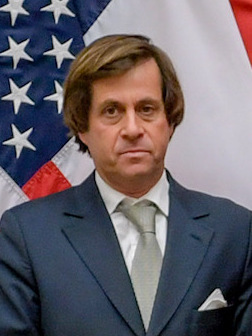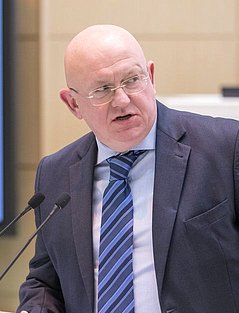Permanent members of the United Nations Security Council
Permanent members of the United Nations Security Council (P5) are five sovereign states to which the United Nations Charter of 1945 grants a permanent seat on the United Nations Security Council (UNSC). The five permanent members are the United States, the Russian Federation (originally the Soviet Union), the United Kingdom, France, and the People's Republic of China (originally the Republic of China). These countries were all allies during World War II, and their permanent status on the UNSC, including the power of veto, reflects the political landscape of the post-war period.
History[edit | edit source]
The concept of permanent membership in the UNSC was established in the founding United Nations Charter signed in 1945. The charter was designed to give the major Allied powers of World War II the responsibility and authority to maintain international peace and security. The inclusion of the Republic of China was symbolic of the anti-Japanese alliance, while the Soviet Union and the Western powers recognized the importance of cooperation in the post-war era. Over time, two significant changes occurred: the People's Republic of China replaced the Republic of China in 1971 (UN General Assembly Resolution 2758), and the Russian Federation succeeded the Soviet Union's seat in 1991 following the latter's dissolution.
Role and Powers[edit | edit source]
The primary role of the permanent members is to maintain international peace and security. They have several powers unique to them under the United Nations Charter, including the authorization of military action, the establishment of peacekeeping operations, the imposition of international sanctions, and other measures to prevent or end conflicts. The most significant power held by the P5 is the veto power, which allows any one of the permanent members to block the adoption of any substantive resolution.
Veto Power[edit | edit source]
The veto power has been a subject of controversy and debate. It allows any one of the P5 to prevent the adoption of any substantive draft Council resolution, regardless of the international support it may have. This power has been criticized for allowing the permanent members to wield disproportionate influence over UNSC decisions and for enabling them to protect their interests and those of their allies, sometimes at the expense of addressing conflicts impartially.
Criticism and Reform Proposals[edit | edit source]
There have been numerous calls for reform of the UNSC, particularly concerning the composition of its permanent membership. Critics argue that the current composition of the P5 does not reflect the 21st-century geopolitical realities. Proposals for reform include expanding the number of permanent members to include countries from regions currently underrepresented, such as Africa, Latin America, and Asia. Additionally, there are suggestions to limit the use of the veto power, especially in cases of mass atrocities.
Conclusion[edit | edit source]
The permanent members of the United Nations Security Council hold significant power in the maintenance of international peace and security. While their role is foundational to the functioning of the UNSC, the use of veto power and the current composition of the P5 continue to be subjects of international debate and calls for reform. As the global political landscape evolves, the discussion around the effectiveness and fairness of the UNSC's structure remains a critical issue in international relations.
This article is a United Nations–related stub. You can help WikiMD by expanding it!
Search WikiMD
Ad.Tired of being Overweight? Try W8MD's physician weight loss program.
Semaglutide (Ozempic / Wegovy and Tirzepatide (Mounjaro / Zepbound) available.
Advertise on WikiMD
|
WikiMD's Wellness Encyclopedia |
| Let Food Be Thy Medicine Medicine Thy Food - Hippocrates |
Translate this page: - East Asian
中文,
日本,
한국어,
South Asian
हिन्दी,
தமிழ்,
తెలుగు,
Urdu,
ಕನ್ನಡ,
Southeast Asian
Indonesian,
Vietnamese,
Thai,
မြန်မာဘာသာ,
বাংলা
European
español,
Deutsch,
français,
Greek,
português do Brasil,
polski,
română,
русский,
Nederlands,
norsk,
svenska,
suomi,
Italian
Middle Eastern & African
عربى,
Turkish,
Persian,
Hebrew,
Afrikaans,
isiZulu,
Kiswahili,
Other
Bulgarian,
Hungarian,
Czech,
Swedish,
മലയാളം,
मराठी,
ਪੰਜਾਬੀ,
ગુજરાતી,
Portuguese,
Ukrainian
Medical Disclaimer: WikiMD is not a substitute for professional medical advice. The information on WikiMD is provided as an information resource only, may be incorrect, outdated or misleading, and is not to be used or relied on for any diagnostic or treatment purposes. Please consult your health care provider before making any healthcare decisions or for guidance about a specific medical condition. WikiMD expressly disclaims responsibility, and shall have no liability, for any damages, loss, injury, or liability whatsoever suffered as a result of your reliance on the information contained in this site. By visiting this site you agree to the foregoing terms and conditions, which may from time to time be changed or supplemented by WikiMD. If you do not agree to the foregoing terms and conditions, you should not enter or use this site. See full disclaimer.
Credits:Most images are courtesy of Wikimedia commons, and templates, categories Wikipedia, licensed under CC BY SA or similar.
Contributors: Prab R. Tumpati, MD






